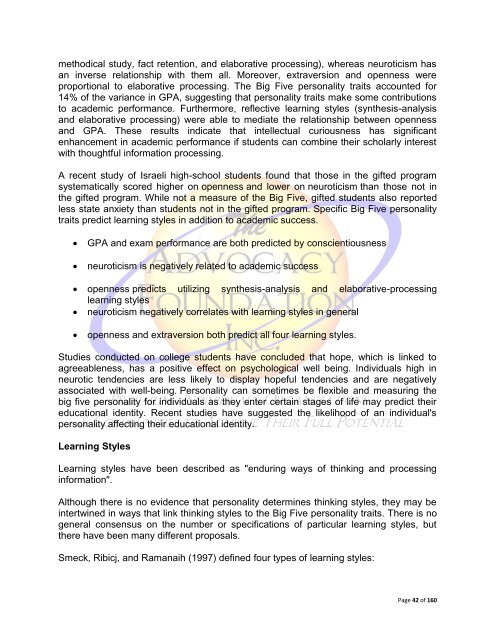The Gift of Introversion
The Gift of Introversion
The Gift of Introversion
Create successful ePaper yourself
Turn your PDF publications into a flip-book with our unique Google optimized e-Paper software.
methodical study, fact retention, and elaborative processing), whereas neuroticism has<br />
an inverse relationship with them all. Moreover, extraversion and openness were<br />
proportional to elaborative processing. <strong>The</strong> Big Five personality traits accounted for<br />
14% <strong>of</strong> the variance in GPA, suggesting that personality traits make some contributions<br />
to academic performance. Furthermore, reflective learning styles (synthesis-analysis<br />
and elaborative processing) were able to mediate the relationship between openness<br />
and GPA. <strong>The</strong>se results indicate that intellectual curiousness has significant<br />
enhancement in academic performance if students can combine their scholarly interest<br />
with thoughtful information processing.<br />
A recent study <strong>of</strong> Israeli high-school students found that those in the gifted program<br />
systematically scored higher on openness and lower on neuroticism than those not in<br />
the gifted program. While not a measure <strong>of</strong> the Big Five, gifted students also reported<br />
less state anxiety than students not in the gifted program. Specific Big Five personality<br />
traits predict learning styles in addition to academic success.<br />
<br />
<br />
GPA and exam performance are both predicted by conscientiousness<br />
neuroticism is negatively related to academic success<br />
openness predicts utilizing synthesis-analysis and elaborative-processing<br />
learning styles<br />
neuroticism negatively correlates with learning styles in general<br />
<br />
openness and extraversion both predict all four learning styles.<br />
Studies conducted on college students have concluded that hope, which is linked to<br />
agreeableness, has a positive effect on psychological well being. Individuals high in<br />
neurotic tendencies are less likely to display hopeful tendencies and are negatively<br />
associated with well-being. Personality can sometimes be flexible and measuring the<br />
big five personality for individuals as they enter certain stages <strong>of</strong> life may predict their<br />
educational identity. Recent studies have suggested the likelihood <strong>of</strong> an individual's<br />
personality affecting their educational identity.<br />
Learning Styles<br />
Learning styles have been described as "enduring ways <strong>of</strong> thinking and processing<br />
information".<br />
Although there is no evidence that personality determines thinking styles, they may be<br />
intertwined in ways that link thinking styles to the Big Five personality traits. <strong>The</strong>re is no<br />
general consensus on the number or specifications <strong>of</strong> particular learning styles, but<br />
there have been many different proposals.<br />
Smeck, Ribicj, and Ramanaih (1997) defined four types <strong>of</strong> learning styles:<br />
Page 42 <strong>of</strong> 160

















